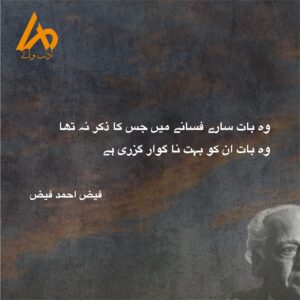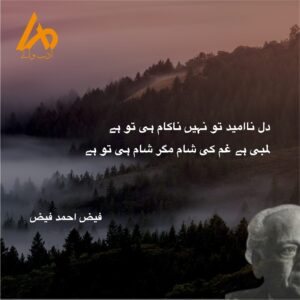Category: Faiz Ahmed Faiz
Faiz Ahmed Faiz (1911-1984) stands as a towering figure in Urdu literature, celebrated as one of the preeminent poets of the 20th century. A revolutionary poet, intellectual, and political activist, Faiz’s verses transcend the boundaries of language and culture, echoing the aspirations and struggles of humanity.
Born in British India, Faiz began his literary journey at an early age. His poetry reflects a deep engagement with the socio-political realities of his time, marked by colonialism, partition, and the subsequent creation of Pakistan. Faiz’s poetic brilliance and commitment to social justice earned him recognition not only as a literary giant but also as a voice for the oppressed.
Faiz’s notable works include “Naqsh-e-Faryadi” (The Engraving of the Sigh) and “Dast-e-Saba” (The Hand of Morning). However, perhaps his magnum opus is the iconic poetry collection “Zindaan Nama” (The Prison Poems), written during his incarceration for his alleged involvement in a political conspiracy. The poems in this collection resonate with themes of freedom, resistance, and the indomitable human spirit.
His poetic style is characterized by simplicity, depth, and a profound connection to the common man’s experiences. Faiz’s ghazals and nazms are known for their lyrical beauty, emotional intensity, and a keen sense of social awareness. His verses often touch upon love, human rights, equality, and the struggle against oppression.
Faiz’s commitment to political activism and advocacy for social justice are evident in his involvement with leftist political movements. He served as the editor of the renowned Pakistani newspaper “The Pakistan Times” and was associated with progressive literary organizations. Faiz’s poetry became a powerful tool for expressing dissent and resistance against authoritarian regimes, both in British India and later in Pakistan.
One of Faiz’s most famous poems, “Hum Dekhenge” (We Shall Witness), became an anthem for protests against oppressive regimes. The poem celebrates the hope for a better future, where tyranny and injustice are overthrown, and the ideals of equality and justice prevail.
Despite facing political persecution and imprisonment, Faiz continued to produce timeless poetry. In 1962, he was awarded the Lenin Peace Prize for his contributions to literature and social justice. His legacy extends beyond the literary realm, influencing subsequent generations of poets, activists, and thinkers.
In the tumultuous landscape of Urdu poetry, Faiz Ahmed Faiz remains an enduring symbol of resistance, resilience, and the transformative power of words. His poetry continues to inspire and resonate with people worldwide, transcending linguistic and cultural boundaries.
فیض احمد فیض: اردو ادب کے عظیم شاعر
فیض احمد فیض (1911-1984) 20ویں صدی کے ارد گرد اردو ادب کے عظیم شاعروں میں سے ایک مقام حاصل کرتے ہیں۔ انہیں ایک انقلابی شاعر، فکریچر، اور سیاستدان کے طور پر پہچانا جاتا ہے، اور ان کی شاعری زبان اور ثقافت کے حدودوں کو پار کرتی ہے، انسانی خواہشات اور جدوجہد کو ہم آہنگی سے گونجتی ہے۔
برطانوی بھارت میں پیدا ہونے والے فیض احمد فیض نے اپنا ادبی سفر جلد شروع کیا۔ ان کی شاعری اس وقت کے معاشرتی و سیاستی حقائق کے ساتھ گہرا تعلق رکھتی ہے، جس میں راج نظام، تقسیم، اور بعد میں پاکستان کی تخلیق شامل ہے۔ فیض کی شاعرانہ شگاف اور سماجی انصاف کے لئے ان کا شعور اسے ایک لٹیرری جائہاں بناتے ہیں، جو اُسے صرف ایک شاعری کے ستھ اکیلا نہیں بلکہ زیادہ تر اپنے دور کے زیادہ تر افراد کے نمائندہ بناتی ہے۔
فیض کے مشہور کلام میں “نقشِ فریادی” اور “دستِ صبا” شامل ہیں۔ لیکن، شاید ان کا اعظم کام ان کی زندانی کے دوران لکھا گیا، جب انہیں ایک سیاستی سازش میں ملوث ہونے کا الزام لگا۔ اس دوران لکھی گئی اس کتاب “زندان نامہ” میں شاعری آزادی، مختاری اور ناقابل شکست انسانی جذبے کو آواز دیتی ہے۔
ان کی شاعری کا انداز سادگی، گہرائی، اور عام انسان کے تجربات سے وابستہ ہے۔ فیض کی غزلوں اور نظموں میں لیریکل خوبصورتی، جذباتی شدت، اور سماجی آگاہی کا خوبصورت اظہار ہے۔ ان کی شاعری عام معاشرتی، انسانی حقوق، برابری، اور ظلم کے خلاف جدوجہد کے موضوعات پر مبنی ہے۔
فیض کا سیاست میں مصروف ہونا اور سماجی انصاف کی حمایت ظاہر ہے ان کے چپیں میں۔ انہوں نے مشہور پاکستانی اخبار “ذی پاکستان ٹائمز” کے ایڈیٹر کے طور پر خدمت کی اور پراگریسو ادبی تنظیموں سے منسلک تھے۔ فیض کی شاعری نے انہیں استبدادی حکومتوں کے خلاف مختلف اظہارات میں اظہار کرنے کے لئے ایک طاقتور ٹول بنا دیا۔
فیض کی مشہور ترین نظموں میں سے ایک “ہم دیکھیں گے” ہے، جو ظلم کے خلاف احتجاجات کے لئے ایک نعرہ بن گئی۔ یہ نظم بہتر مستقبل کی امید کرتی ہے، جہاں ظلم اور ناانصاف کو اٹھا دیا جائے گا، اور برابری اور انصاف کے اصول غالب ہوں گے۔
سیاستی ستمبر اور قید کا سامنا کرنے کے باوجود، فیض نے مخلد شاعری پیدا کی۔ 1962 میں، انہیں ان کے ادبی اور سماجی حقوق کی خدمات کے لئے لینن امن پرائز سے نوازا گیا۔ ان کا ورثہ ادبی حدودوں کو پار کرتا ہے اور آئندہ کی نسلوں کے شاعروں، سیاستدانوں، اور سوچنے والوں پر اپنا اثر چھوڑتا ہے۔
ارد گرد اردو شاعری کے ہمہ مقدس میدان میں، فیض احمد فیض مستقل مزاحمت، استقامت، اور الفاظ کی تحولی کی قوت کا نمائندہ بنا ہوا ہے۔ ان کی شاعری دنیا بھر میں لوگوں کو متاثر کرتی ہے اور لسانی اور ثقافتی حدودوں کو پار کرتی ہے۔


